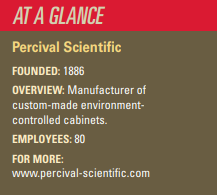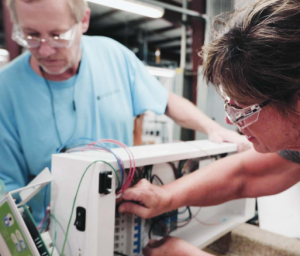 A worldwide leader in the design and manufacture of custom-made environment-controlled cabinets credits CIRAS with bringing a possible new market space to their attention.
A worldwide leader in the design and manufacture of custom-made environment-controlled cabinets credits CIRAS with bringing a possible new market space to their attention.
Percival Scientific, founded in 1886 and located in Perry, is exploring the feasibility of adapting its current product line to include cabinets for aging and fermenting meat. The idea was suggested to the company by Paul Gormley, a CIRAS project manager.
“I’d been working with meat processors and noticed that one trend in the industry was aged meats,” said Gormley. “I’d also done projects with Percival Scientific, and I knew their capabilities. That got me thinking about what could happen if we put those two things together.”
Gormley took the idea to Terry Houser at the Iowa State University Meats Lab, who agreed that both aging and fermenting—a process used in products like summer sausage—could be done in climate-controlled chambers like those made at Percival. Gormley next approached the business.
“As a company we’re always looking at expansion opportunities,” said Joni Campidilli, vice president of sales and marketing at Percival. “This idea appealed to us because we saw how we could potentially get into a new market space without making a lot of changes to our current product line.”
Percival Scientific started as a dealer of tools and equipment for butchers. In the early 1900s, the company introduced one of the nation’s first display cases for refrigerated produce and meats. The next several decades were spent manufacturing a complete line of made to-order commercial refrigerated display cabinets.
Percival built its first environment controlled cabinet for growing plants in the early 1950s at the request of Iowa State University. Within three decades, the cabinets accounted for half the company’s business. In 1989, Percival completely ceased manufacturing commercial display units to focus entirely on controlled environment products.

No final decision on a new product line has been made, though the company plans to gauge interest in the concept at a food industry trade show. They’ll go armed with research done by CJ Osborn, a CIRAS project manager. Osborn assisted the company by reviewing secondary research, and by working closely with a market research professional to create a survey on the demand for aging and fermenting cabinets and also completing interviews with prospective stakeholders like chefs and sausage makers.
“We were so energized by what CJ and team brought to us,” Campidilli said. “They covered how to bring a new product to market, how to launch it, and how to interview prospective customers. They gave us everything we need to decide what we want to do next.”
For more information, contact CJ Osborn at cjosborn@iastate.edu or 641-840-0505.